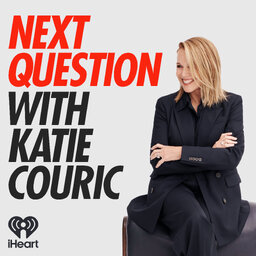At the height of Journey’s success, frontman Steve Perry walked away from the band and his life as a rockstar in search of a quieter existence. Now, 30 years later, he’s back with the solo album Traces. Katie caught up with Steve about what he’s been doing on his very, very long vacation, why his journey with Journey had to end, and the late-in-life love whose death inspired the new album. Plus, the story behind the lyrics of “Don’t Stop Believin’,” Journey’s smash hit that went on to be the most downloaded song of the twentieth century.
Learn more about your ad-choices at https://www.iheartpodcastnetwork.com
In 1 playlist(s)
Next Question with Katie Couric
Tired of political headlines that feel like déjà vu? Wondering if you actually need to care about ev…Social links
Follow podcast
Recent clips

Kate Hudson At Her Best
39:12

Katie’s One-on-One With PA Governor Josh Shapiro
53:29

2025 in Review
1:03:17
 Next Question with Katie Couric
Next Question with Katie Couric